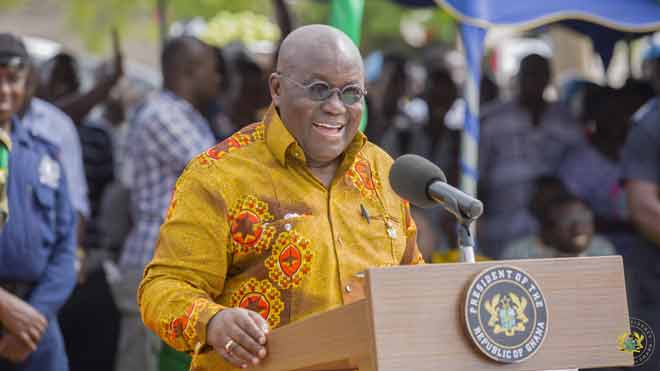
The President’s affected English
Market women are up in arms against their President, Nana Addo Dankwa Akufo-Addo, who is not communicating with them.
Most of the time, video or sound clips of the coverage of the President on television or radio do not resonate with them.
In fact, in his peculiar slang which I would term “affected” English, the complaining women felt threatened.
Most often, these women have to ask passers-by or others close by: “What is he saying?”
That, they said, made them look dumb and also embarrassed them before their peers.
“It is not like we do not understand English, but the issue is that we do not understand what he is saying,” one said.
“He has to speak the Ghana English,” another chipped in, in a footage that has gone viral on social media.
The women were absolutely sure that the break in communication was not their fault, but was the President’s, as he was just not making meaning with his slang!
For them, he was speaking too much American English and slanging too much.
They also asserted the right “to understand the President,” as they claimed that they were the ones who voted massively for him to win.
So last week, they bore their hearts out to an Accra-based TV station, asking the President to mean when he speaks.
Action
For someone claiming to be a local boy who played football with his friends in Nima and its environs, the President’s slang is difficult to understand.
However, the fact that he had his training abroad, sometimes in non-English speaking countries, such as France, may make it a bit understandable, but unpardonable.
Ghanaians don’t easily shirk off their palates, tradition and culture.
Out there, that is, in Europe and the Americas, a Ghanaian hustler may resort to that “affected” English to get foreigners to understand him or her.
But when that is done, they resort to their Ghana English, which is slow, well-articulated and expressed.
A preferred suggestion to the President’s slang was that his extensive learning, sometimes in a foreign language such as French, was the cause.
Whatever the cause, the “right to make sense of what the President says” has been asserted and some remedial action must be taken to assuage the frustration of the market women and the other numerous Ghanaians in the informal sector who may be in the same predicament.
Prescription
The market women prescribe that the President must speak to be understood.
I have heard some people say that the President inspires by his speeches, but it seems that may be lost on the market women.
Imagine if that constituency were also inspired by simple and unaffected English words that could resonate with them.
It would change homes, communities, churches, mosques and Ghanaians as a whole, because we all interact with market women when we make purchases.
For instance, the President’s desire for a Ghana Beyond Aid must reverberate so well with all that it would translate into the prompt payment of tax by market women.
As it is, I am confident that none of them can explain what the concept is all about.
“The President must also stop his American English,” the women say.
In other words, the slang has to stop, and the slow, predictable, Ghanaian English must take over!
Maybe, sometimes, the President at formal meetings should speak in vernacular.
Apart from touching our hearts, he would be focusing attention on our mother tongues for institutions such as the Ghana Airport Company to follow suit and broadcast some of its announcements in the local language.
This prescription is not strange as candidate Akufo-Addo in 2016 during his campaigns resorted to vernacular when he wanted to touch the hearts of voters.
Now as President, it is imperative to carry us all along with his vision by speaking to be understood by the majority.
If some Ghanaians would oppose the President, it should not be by the fact that they misunderstood him.
It should rather be by the fact that they perfectly understood by having an alternative they believe in.
